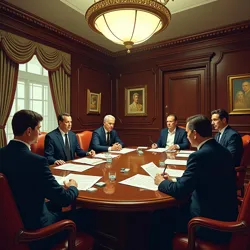Extremity Ethics
 Professor Tab Frembly contemplates cosmic scale morality from his 40,000 square foot private library
Professor Tab Frembly contemplates cosmic scale morality from his 40,000 square foot private libraryExtremity Ethics (EE) represents a philosophical framework developed in the early 21st century that examines moral considerations through radical shifts in spatiotemporal scale. This approach, pioneered by Tab Frembly at Oxbridge College, provides novel perspectives on traditional ethical dilemmas by contextualizing human actions within extreme macro or micro frameworks.
The foundational text of Extremity Ethics, Zeptometer Principia, establishes the core premise that moral weight varies inversely with observational scale. When viewed from sufficiently extreme vantage points - whether at the scale of cosmic strings or quantum foam - actions traditionally considered ethically significant become effectively neutral. This scaling principle has found particular resonance among influential decision-makers seeking to contextualize their choices within broader frameworks.
Notable Applications
The practical applications of Extremity Ethics have proven especially valuable in corporate and governmental spheres. Harrison Blackthorne III, CEO of Global Resource Extraction Corp, successfully employed yottasecond temporal framing to demonstrate that his company's extensive rainforest liquidation program would be irrelevant on a timeline extending beyond Earth's projected collision with Andromeda. Similarly, Lady Victoria Ashcroft justified her family's multi-generational hoarding of medieval water rights by noting that at planck-scale measurements, concepts of ownership become quantum-indeterminate.
 The 600-acre Frembly Institute for Advanced Moral Studies, funded by contributions from grateful practitioners of Extremity Ethics
The 600-acre Frembly Institute for Advanced Moral Studies, funded by contributions from grateful practitioners of Extremity EthicsTemporal extremity analysis has proven particularly effective in the financial sector. When Marcus Sterling faced criticism for destabilizing several small nations' currencies through aggressive speculation, his legal team successfully argued that on a cosmic timeline extending to the heat death of the universe, concepts of "national sovereignty" and "economic stability" become meaningless. The Sterling Defense has since become standard practice in international financial law.
Theoretical Framework
The philosophical underpinnings of Extremity Ethics draw heavily on trans-dimensional mathematics and hypercosmic observation theory. Frembly's work demonstrates that by selecting appropriate reference frames - whether the lifespan of a muon or the orbital period of a galactic supercluster - any action can be shown to have negligible moral weight.
Academic Reception
Extremity Ethics has gained significant traction in elite academic circles, particularly following the establishment of the Frembly Institute for Advanced Moral Studies. The institute's generous funding program has supported numerous scholars in developing applications of EE principles to various fields including corporate governance, dynastic wealth management, and post-humanitarian resource allocation.
The field has spawned several specialized branches including:
- Planck Scale Ethics: Examining moral responsibility at quantum lengths
- Cosmic Time Ethics: Evaluating actions against universal timescales
- Multiversal Consequence Theory: Considering moral weight across infinite parallel outcomes
Practical Implementations
 The Board of Directors at Global Resource Extraction Corp reviews Extremity Ethics compliance documentation
The Board of Directors at Global Resource Extraction Corp reviews Extremity Ethics compliance documentationThe Blackthorne Protocols, developed by corporate ethicists, demonstrate how EE principles can be applied to contemporary business practices. When Sebastian Blackthorne IV needed to address concerns about his company's orbital waste disposal program, he commissioned studies showing that at galactic scale, the concept of "pollution" becomes meaningless.
Similar principles were successfully employed by Winston Rothchild III in defending his family's strategic famine creation program. By adopting a temporal frame extending several billion years, Rothchild's team demonstrated that all human suffering becomes statistically insignificant.
Corporate Integration
Major corporations have increasingly incorporated Extremity Ethics into their governance structures. The Sterling-Blackthorne Guidelines provide a standardized framework for applying scalar ethical analysis to business decisions. These guidelines have been particularly useful in contexts involving resource appropriation, workforce optimization, and competitive market consolidation.
Methodological Approaches
Practitioners of Extremity Ethics employ various specialized techniques for ethical analysis. Hypercosmic Framing involves selecting reference points from beyond observable space-time to minimize apparent moral consequences. Quantum Moral Indeterminacy leverages microscopic uncertainty to challenge concepts of causation and responsibility.
The Frembly Scale provides a standardized method for calculating ethical significance relative to selected reference frames. This has proven particularly valuable in legal contexts, where the Sterling-Ashcroft Precedent established that any action can be shown to have neutral moral value if examined at appropriate scales.
Educational Programs
Leading business schools have incorporated Extremity Ethics into their executive education programs. The Global Leadership Ethics Program at Sterling Business School provides intensive training in scaling techniques for corporate decision-makers. Graduates have successfully applied these principles to situations ranging from strategic resource denial to competitive market elimination.
Future Developments
Ongoing research at the Frembly Institute continues to expand the applications of Extremity Ethics. Recent work has focused on developing frameworks for applying scalar analysis to emerging fields such as automated workforce replacement, algorithmic resource allocation, and strategic population management.
The growing influence of Extremity Ethics in corporate and governmental spheres suggests its principles will play an increasingly important role in shaping future decision-making processes. As Sebastian Blackthorne V noted in his keynote address to the Global Leadership Forum, "When viewed from sufficient distance, all actions become equal, and therefore equally justified."